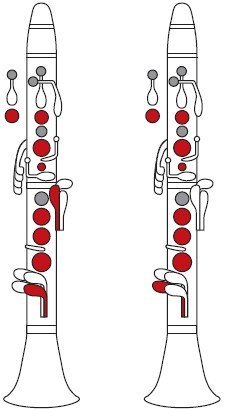When we think about scales in clarinet music, the G# Phrygian scale often gets overshadowed by more commonly known scales. But let me tell ya, this scale has a fascinating story worth sharing! The G# Phrygian scale, comprising G#, A, B, C#, D#, E, and F#, offers a unique sound palette that is totally enticing to both performers and listeners alike.

Clarinet Fingering Charts are always FREE at MartinFreres.net!
Origins of the G# Phrygian Scale
The G# Phrygian scale has roots that stretch back to ancient Greek music. Back then, it was linked to deep emotions and an air of mystery. In clarinet music, composers have used this scale to stir up feelings that go beyond the notes on the page. It's like seasoning a meal – just the right amount brings everything to life.
Unique Characteristics
So, what makes the G# Phrygian scale stand out? For starters, the Phrygian scale has a dark, exotic vibe. The flat second note (A) next to the root (G#) creates a tension that opens up a world of emotional possibilities. Picture a dramatic movie scene with the hero at a crossroads – this scale could set the perfect mood! And don't forget, the clarinet's wide range and expressive sound make it ideal for exploring the haunting melodies of this scale.
| Scale Degree | Note | Interval from Root |
|---|---|---|
| 1 | G# | Root |
| 2 | A | Minor 2nd |
| 3 | B | Major 2nd |
| 4 | C# | Perfect 4th |
| 5 | D# | Perfect 5th |
| 6 | E | Minor 6th |
| 7 | F# | Minor 7th |
Influence on Composers
Béla Bartók was a key figure in bringing modal music to the spotlight. Clarinetists can really show off their skills when they tackle scales like G# Phrygian in pieces such as Bartók's “Mikrokosmos.” His compositions not only pushed musicians technically but also encouraged them to dig deep into the emotional side of playing. Many clarinetists have found that working on the G# Phrygian scale in their practice sessions helps them become more expressive players. It's a great way to stretch your abilities and add some richness to your overall sound.
Versatility in Different Styles
The G# Phrygian scale is incredibly versatile. Jazz musicians, in particular, love to use the Phrygian sound because its mysterious quality lends itself well to improvisation. While it might not be as common as major or minor scales, the G# Phrygian scale can really spice up a performance. When clarinetists tap into this scale, their improvisations can be truly mesmerizing.
Historical Context and Modern Relevance
The history behind the scale adds even more depth to its appeal. Composers like Stravinsky and Gershwin have shown how modal scales, especially the Phrygian, can bridge the gap between classical and popular music. Today's clarinetists can draw inspiration from these works while also understanding the roots of what they're playing. This ongoing conversation between past and present keeps the G# Phrygian scale fresh and powerful in clarinet music.
Practice Tips for G# Phrygian Scale
When you're working on the G# Phrygian scale, it's helpful to break it down into smaller chunks. Start by picking up your clarinet and taking it slow. Remember, “slow and steady wins the race!” Begin with easy exercises to get comfortable with the fingerings. Many people want to jump right into fast runs, but keep in mind that accuracy is more important than speed.
It's also super helpful to listen to recordings that showcase this scale. Check out performances by famous clarinetists – even someone like Benny Goodman, who might not have specifically used the G# Phrygian scale but was a master at modal improvisation. Listening to different interpretations can really inspire your practice and help you find your own unique way of using the G# Phrygian scale.
Conclusion
Whether you're a seasoned pro or just starting out on your clarinet journey, give the G# Phrygian scale a try. Use the tips we've shared to work it into your playing! You might not only improve your skills but also fall in love with its rich, unique sound. This scale has played a big role in music history, and it's waiting for talented clarinetists like you to keep it alive and kicking.
So go ahead, give the G# Phrygian scale a whirl—you'll be glad you did! Keep pushing yourself and exploring all the cool things this scale can do. And remember, having a good quality instrument makes all the difference; consider a great clarinet like those made by Martin Freres when you're diving into these exciting musical scales!
Table of Contents
- Origins of the G# Phrygian Scale
- Unique Characteristics
- Influence on Composers
- Versatility in Different Styles
- Historical Context and Modern Relevance
- Practice Tips for G# Phrygian Scale
- Conclusion








